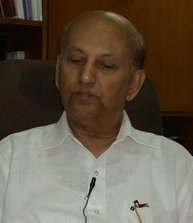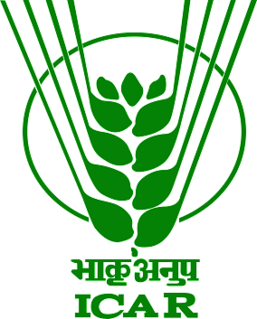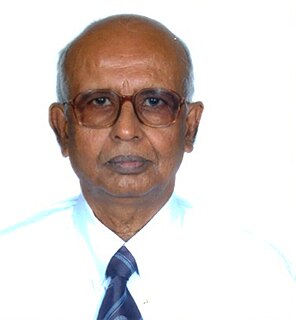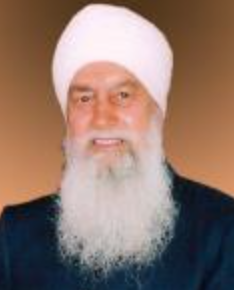
Udupi Ramachandra Rao was an Indian space scientist and chairman of the Indian Space Research Organisation. He was also the Chairman of the Governing Council of the Physical Research Laboratory at Ahmedabad and Nehru Planetarium at Bengaluru and chancellor of the Indian Institute for Space Science and Technology (IIST) at Thiruvananthapuram. He is known as "The Satellite Man of India." He pioneered India's first satellite launch "Aryabhatta" in 1975.

The Indian Council of Agricultural Research (ICAR) is an autonomous body responsible for co-ordinating agricultural education and research in India. It reports to the Department of Agricultural Research and Education, Ministry of Agriculture. The Union Minister of Agriculture serves as its president. It is the largest network of agricultural research and education institutes in the world.

Patcha Ramachandra Rao was a metallurgist and administrator. He has the unique distinction of being the only Vice-Chancellor (2002–05) of the Banaras Hindu University (BHU) who was also a student (1963–68) and faculty (1964–92) at that institution. From 1992 to 2002, Rao was the Director of the National Metallurgical Laboratory, Jamshedpur. After his tenure as Vice-Chancellor of B.H.U., in 2005, he took the reins of the Defence Institute of Advanced Technology (DIAT) as its first Vice-Chancellor. He was to serve DIAT until his superannuation in 2007. From 2007 till the end, Rao was a Raja Ramanna Fellow at the International Advanced Research Centre for Powder Metallurgy and New Materials, in Hyderabad, Andhra Pradesh.
Krishna N. Ganesh is an Indian chemist. Currently, he is the director of Indian Institute of Science Education and Research, Tirupati. He was previously the director of the Indian Institute of Science Education and Research, Pune.
Palle Rama Rao FREng is an Indian scientist noted for his contribution to the field of Physical and Mechanical Metallurgy. He has collaborated and conducted research activities for over dozen universities and associations all over India and abroad. He has been honoured with the titles of Padma Vibhushan in 2011 by president of India for his contributions to scientific community. He is acting as the chairman, Governing Council, International Advanced Research Centre for Powder Metallurgy & New Materials (ARCI), Hyderabad.
Ch. Mohan Rao is an Indian molecular biologist. He holds a Ph.D. in chemistry from the University of Hyderabad. He was a visiting associate at the National Institutes of Health, US, during 1990–92. He was a visiting professor at the Tokyo Science University, Japan during 1996. Visiting Scientist, UTMB, Galveston, USA, Visiting Professor, Protein Research Institute, Osaka, Japan. Adjunct Professor, RMIT University, Melbourne, Australia. He was positioned as director for the Centre for Cellular and Molecular Biology in Hyderabad, India. He is CSIR-Distinguished Scientist and Sir JC Bose National Fellow at CCMB He was awarded in 1999 the Shanti Swarup Bhatnagar Prize for Science and Technology, the highest science award in India, in the Medical Sciences category.

Indian Institute of Food Processing Technology (IIFPT) is an educational institution functioning under the Ministry of Food Processing Industries (MoFPI) located at Thanjavur, Tamil Nadu. The Institute offers academic and research programmes in the field of food processing technology. The institute has National Accreditation Board for Testing and Calibration Laboratories (NABL) accredited food quality testing laboratory which is also notified Food Safety and Standards Authority of India (FSSAI) Referral Food Laboratory. Food product development laboratory, food microbiology laboratory, post harvest pest management laboratory, food processing incubation center, and food engineering laboratories are in its main campus at Thanjavur. IIFPT is operating liaison offices at Guwahati, Assam and Bathinda, Punjab. These liaison offices have facilities to give skill development trainings, incubation and consultancy services to the farmers, entrepreneurs and students in the field of value addition of agricultural produce and food processing technologies It was granted the Institute of National Importance status in 2021.

Bulusu Lakshmana Deekshatulu is an Indian academic who has made important contributions to Digital Image Processing and Control Theory. He is a Fellow of The World Academy of Sciences, Fellow of Indian National Science Academy, The National Academy of Sciences, India, Indian Academy of Sciences, Indian National Academy of Engineering, National Academy of Agricultural Sciences, and IEEE.

Alla Venkata Rama Rao is an Indian inventor and chemist, known for his pioneering researches in the field of drug technology. He is the founder of the A. V. Rama Rao Research Foundation, a non governmental organization promoting research and doctoral studies in chemistry and Avra Laboratories, an organization dealing in intermediates and active pharmaceutical ingredients, used in therapeutics. An elected fellow of the Indian National Science Academy, Indian Academy of Sciences, National Academy of Sciences, India, and Third World Academy of Sciences (TWAS), Rama Rao is a recipient of several awards such as TWAS Technology Award, VASVIK Industrial Research Award and Om Prakash Bhasin Award. The Government of India awarded him Padma Shri in 1991 and Padma Bhushan in 2016.
Mangina Venkateswara Rao was an Indian agricultural scientist, plant breeder, geneticist and the chairman of the Agri Biotech Foundation. He was a former Vice Chancellor of the Acharya N. G. Ranga Agricultural University and a former Deputy Director of the Indian Council of Agricultural Research (ICAR). Rao, a recipient of the Norman Borlaug Award, was awarded the fourth highest civilian award of the Padma Shri, by the Government of India, in 1999.
Joseph H. Hulse (1923–2013) was a Canadian biochemist, food technologist, writer, and the president of the International Union of Food Science and Technology. He chaired the Committee of the Canadian chapter of the Freedom From Hunger, presided over the Canadian Institute of Food Science and Technology and was the assistant director of nutrition at the Food and Agriculture Organization, besides serving as the vice president of the International Development Research Centre (IDRC). He was the author of several texts and monographs on nutrition and allied sciences, including a 991-page treatise, Sorghum and the Millets: Their Composition and Nutritive Value. The Government of India awarded him the fourth highest civilian honour of the Padma Shri, in 2008, for his contributions to Science and for his humanitarian activities in India.

Kodeboyina Sivannarayana Varaprasad is an Indian agricultural scientist, Nematologist and the Director of Indian Institute of Oilseeds Research, Rajendranagar, Hyderabad. He was former Head of NBPGR, Regional Station at Hyderabad for about a period of 26 years. and was associated in the development of 11 genetic stocks in tomato, linseed, jatropha, cowpea, chilli and sorghum. Dr.K.S.Varaprasad is recipient of Late Sri P.P. Singhal Memorial Award, 2015.

Khem Singh Gill was an Indian academic, geneticist, plant breeder and Vice-Chancellor of the Punjab Agricultural University. He was known for his contributions to the Green Revolution in India. Instrumental for breeding new strains of wheat, linseed, and sesame, he was the author of the book Research on wheat and triticale in the Punjab along with several additional articles on the subject. He was also the Vice-President of The Kalgidhar Trust and The Kalgidhar Society, Baru Sahib, which is one of the largest Sikh charities. A Sant Teja Singh Chair Professor in Sikhism of the Eternal Global University and a founding fellow of The World Academy of Sciences, he was a recipient of Rafi Ahmad Kidwai Memorial Prize, Team Research Award of the Indian Council of Agricultural Research (ICAR), FICCI Award, ICAR Golden Jubilee Award and Silver Jubilee Award of the Indian Society of Oilseeds Research. In 1992, the Government of India awarded him the third highest civilian honor of the Padma Bhushan for his contributions to science.
Neelamraju Ganga Prasada Rao was an Indian geneticist and plant breeder, known for his efforts in developing hybrid varieties of sorghum, which earned him the moniker, the Father of Hybrid Sorghum. He was the vice chancellor of Vasantrao Naik Marathwada Agricultural University and chaired the Agricultural Scientists Recruitment Board of the Indian Council of Agricultural Research. He was a recipient of several national honors including Rafi Ahmed Kidwai Award and the VASVIK Industrial Research Award. The Council of Scientific and Industrial Research, the apex agency of the Government of India for scientific research, awarded him the Shanti Swarup Bhatnagar Prize for Science and Technology, one of the highest Indian science awards, in 1966, for his contributions to biological sciences.
Bhyravabhotla Radhakrishna Murty (1928–2003) was an Indian botanist, known for his contributions the fields of Conservation genetics and Radiation genetics. He was a professor of Biochemistry Division at Indian Agricultural Research Institute, Pusa and was an elected fellow of Indian Academy of Sciences and the Indian National Science Academy. The Council of Scientific and Industrial Research, the apex agency of the Government of India for scientific research, awarded him the Shanti Swarup Bhatnagar Prize for Science and Technology, one of the highest Indian science awards, in 1973, for his contributions to biological sciences.
Ganugapati Sree Rama Subba Rao is an Indian natural product chemist and a former chair of the department of sciences at the Indian Institute of Science (IISc). He is known for his researches on dihydroaromatics obtained through Birch reduction of aromatic compounds and is an elected fellow of the Indian National Science Academy, and the Indian Academy of Sciences. The Council of Scientific and Industrial Research, the apex agency of the Government of India for scientific research, awarded him the Shanti Swarup Bhatnagar Prize for Science and Technology, one of the highest Indian science awards, in 1982, for his contributions to chemical sciences.
The Indian Institute of Millets Research (ICAR-IIMR) located at Rajendranagar is an agricultural research institute engaged in basic and strategic research on sorghum and other millets. IIMR operates under the aegis of Indian Council of Agricultural Research (ICAR). It conducts agricultural research on Millets breeding, improvement, pathology and value addition. IIMR coordinates and facilitates sorghum research at national level through the All India Coordinated Research Projects on Sorghum and provides linkages with various national and international agencies.

Anandharamakrishnan Chinnaswamy, commonly referred as Anandharamakrishnan is an Indian scientist and academician in the field of food processing. He has two decades of experience in R&D at the CSIR - Central Food Technological Research Institute (CFTRI). From April 2016, he is serving as Director of Indian Institute of Food Processing Technology, Thanjavur, Tamil Nadu.
G. Taru Sharma is an Indian biologist and the head of the physiology and climatology division at the Indian Veterinary Research Institute of the Indian Council of Agricultural Research. Known for her studies on germ cell marker genes, Sharma is an elected fellow of the National Academy of Agricultural Sciences and National Academy of Sciences (NASI). The Department of Biotechnology of the Government of India awarded her the National Bioscience Award for Career Development, one of the highest Indian science awards, for her contributions to biosciences in 2006.
Tilak Raj Sharma is an Indian plant biologist, the executive director of the National Agri-Food Biotechnology Institute (NABI), and the chief executive officer of the Center of Innovative and Applied Bioprocessing (CIAB), both autonomous institutes under the Department of Biotechnology. Known for his studies in the fields of genomics and plant disease resistance, Sharma is an elected fellow of the National Academy of Sciences, India, the National Academy of Agricultural Sciences and the Indian National Science Academy. The Department of Biotechnology of the Government of India awarded him the National Bioscience Award for Career Development, one of the highest Indian science awards, for his contributions to biosciences in 2007.









